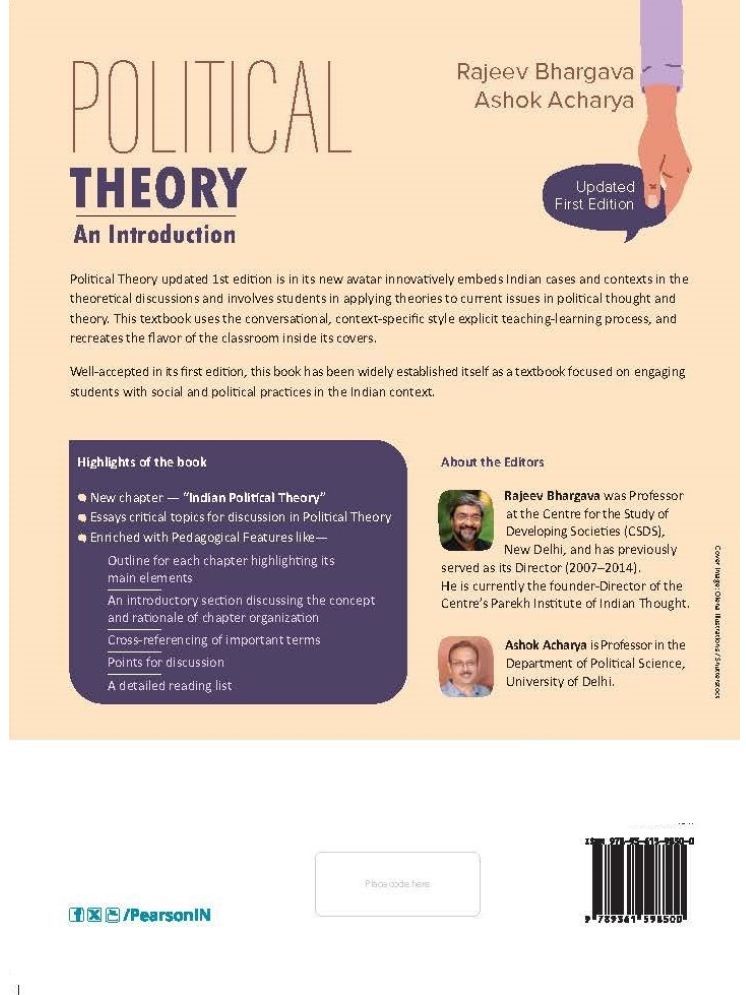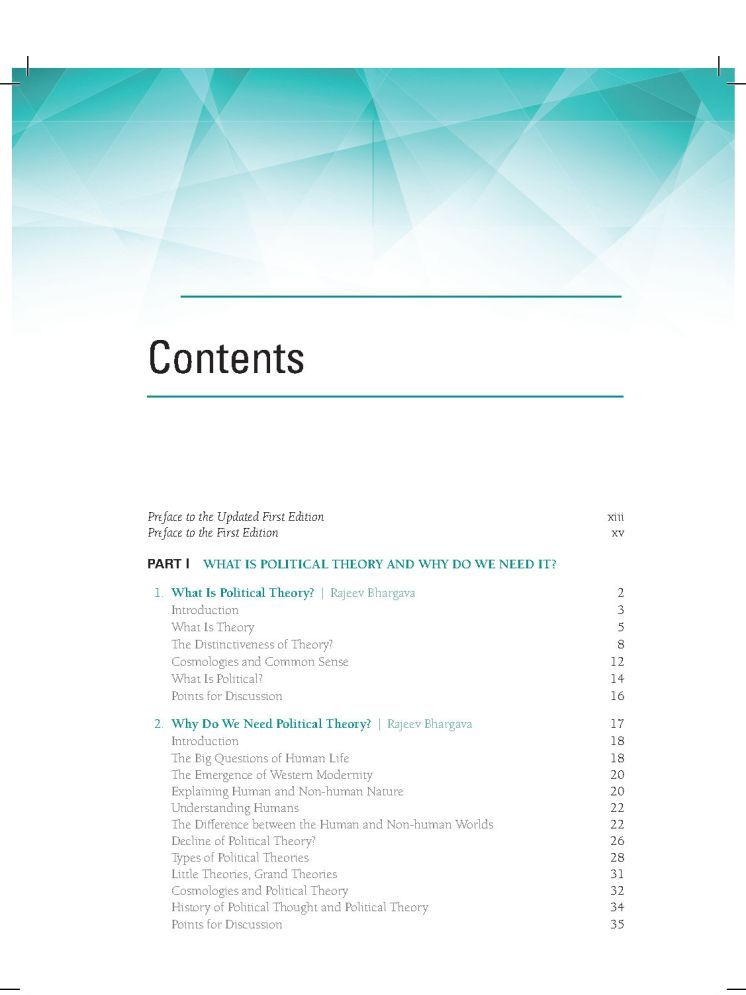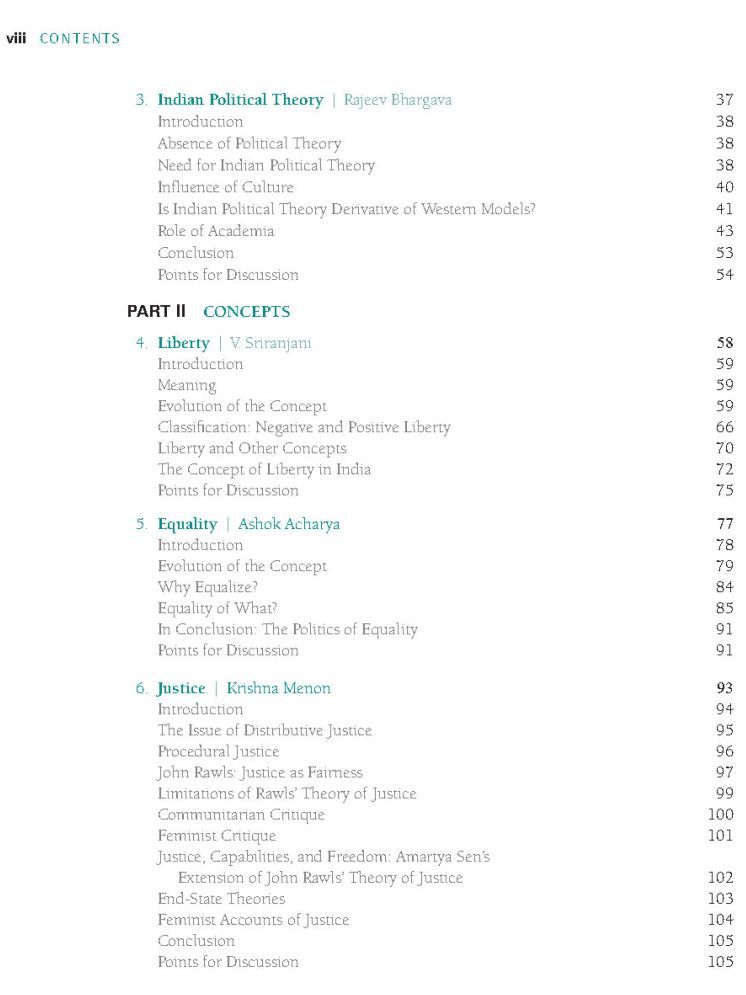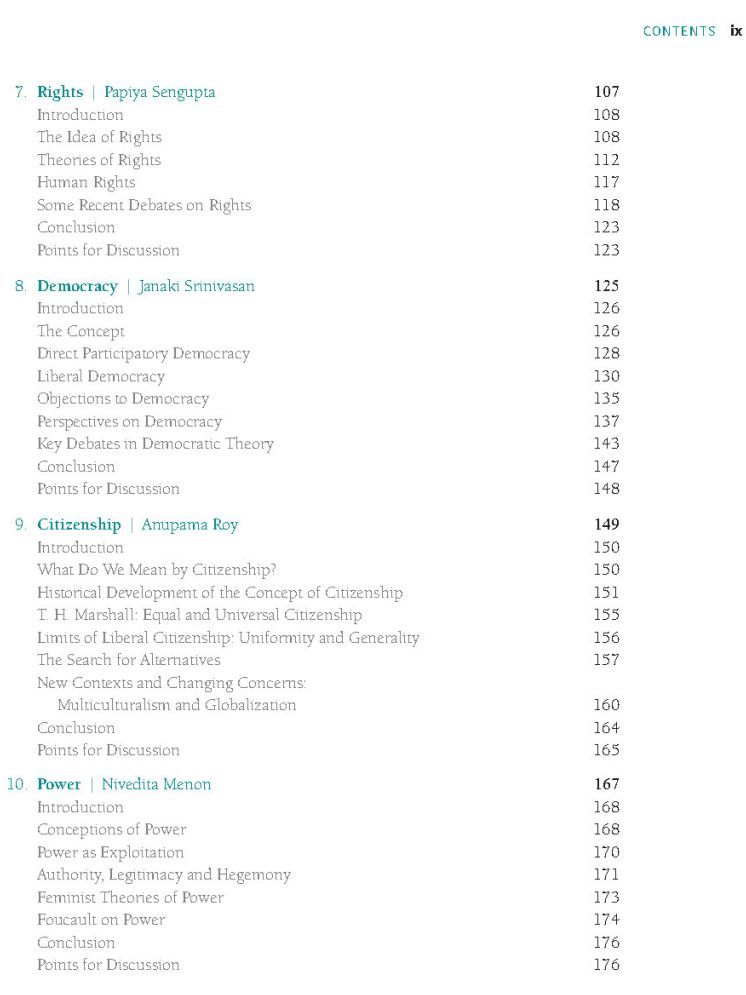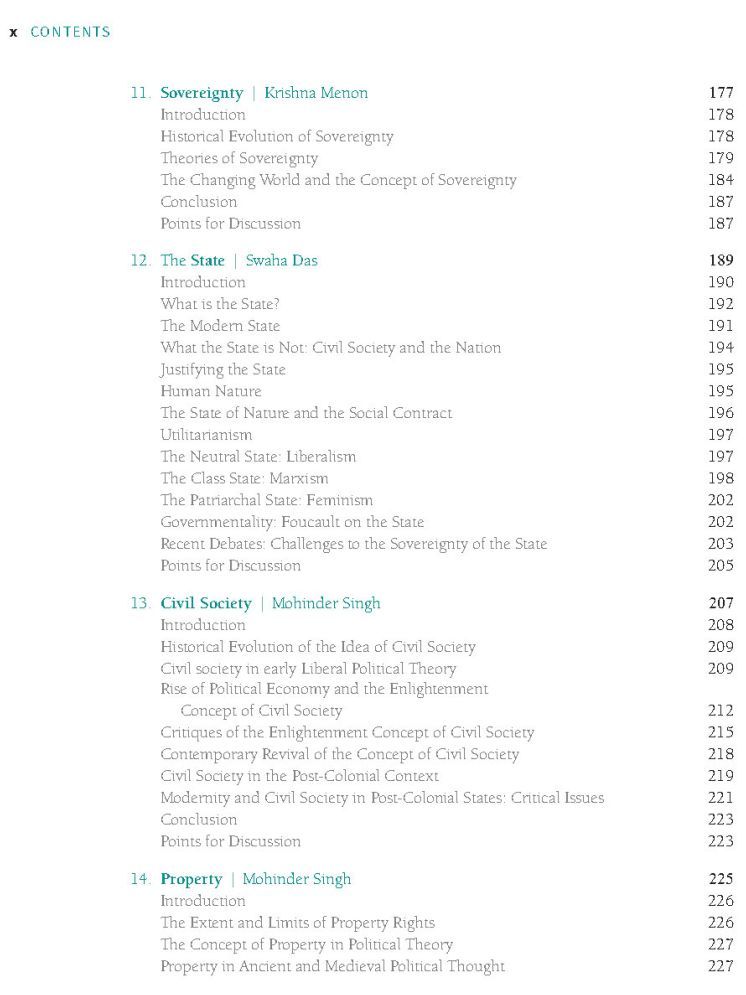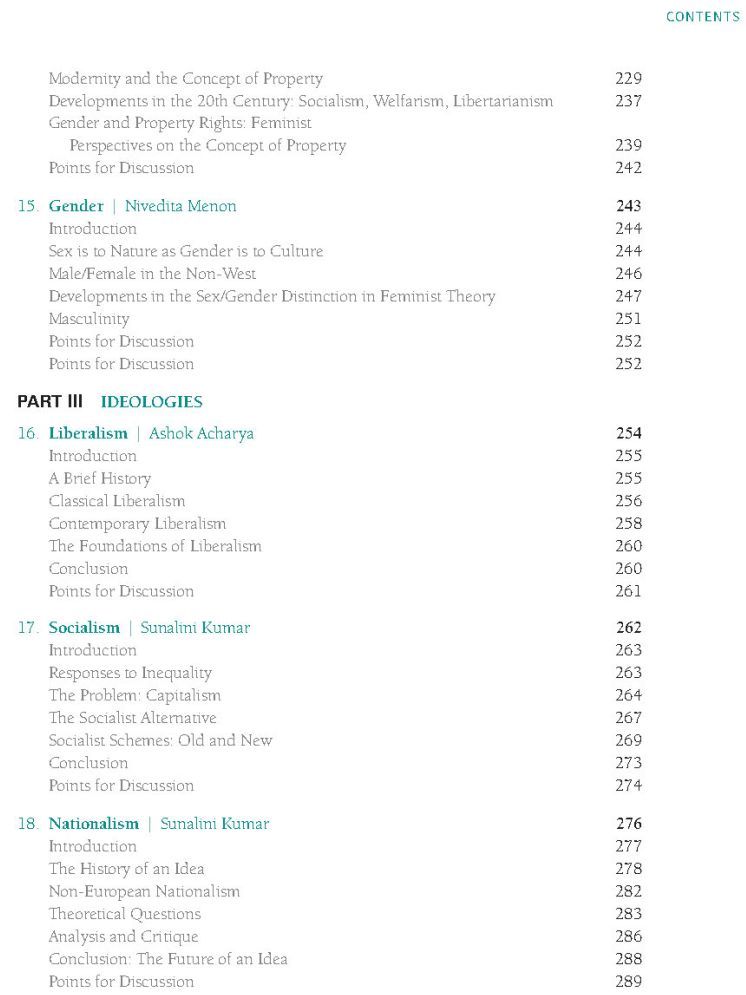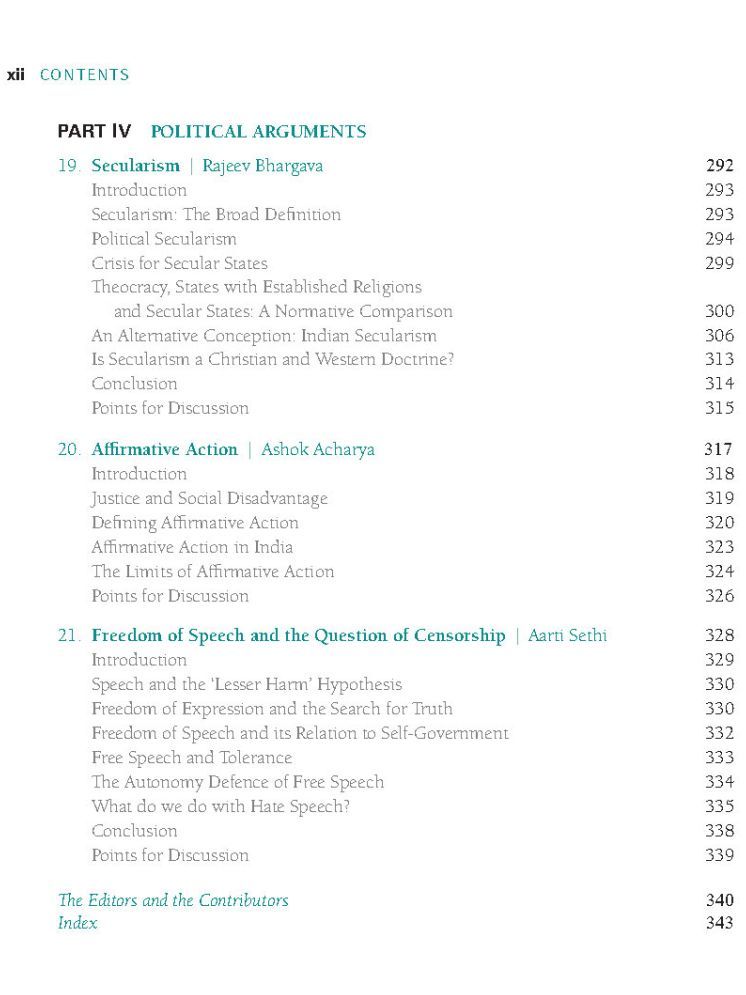Political Theory updated 1st edition is in its new avatar innovatively embeds Indian cases and contexts in the theoretical discussions and involves students in applying theories to current issues in political thought and theory.
This textbook uses the conversational, context-specific style explicit teaching-learning process, and recreates the flavor of the classroom inside its covers. Well-accepted in its first edition, this book has been widely established itself as a textbook focused on engaging students with social and political practices in the Indian context.
Features –
1. New chapter — “Indian Political Theory”
2. Essays critical topics for discussion in Political Theory
3. Enriched with Pedagogical Features like—
A. Outline for each chapter highlighting its main elements
B. An introductory section discussing the concept and rationale of chapter organization
C. Cross-referencing of important terms
D. Points for discussion
E. A detailed reading list
About the Author -
Rajeev Bhargava was until recently a professor at the Centre for the Study of Developing Societies, New Delhi, and between 2007– 2014 served as its Director. He is currently the founder-director of the Centre’s Parekh Institute of Indian Thought. He is a permanent (honorary) fellow at Balliol College (Oxford). He has been a professor of political science at Jawaharlal Nehru University and was between 2002–2005, the HOD, Political Science, University of Delhi. He has been a fellow at Harvard University, Columbia University, Stanford University, New York University, Institute of Advanced Studies (Jerusalem), Wissenschaftskolleg (Berlin), Institute for Human Sciences (Vienna), Australian Catholic University (Sydney), and University of Leipzig.
His many publications include Reimagining Secularism (2023), Between Hope and Despair (2022), The Promise of India’s Secular Democracy (2010), Politics and Ethics of The Indian Constitution (2008) and Secularism and its Critics (1998) and Individualism in Social Sciences (1992). His work on secularism and individualism is internationally acclaimed.
Ashok Acharya is Professor in the Department of Political Science, University of Delhi and Global Justice Fellow, Yale University. He received his PhD from the University of Toronto as a Commonwealth scholar. He is the editor of Citizenship in a Globalizing World (Pearson, 2012; 2nd revised edn., 2022) besides publishing in areas of multiculturalism, social justice and affirmative action. He has been a Fellow at the Australian Social Science Academy, Canberra, the India Fellow at the University of Birmingham, UK and has also held the Henry Hart Rice Visiting Professorship at Yale University for the year 2012–13, besides being a visiting scholar at the universities of Oslo, Humboldt, Nanjing, Gadjah Mada, ANU, Sydney, Monash, and Griffith.
His areas of research interest include comparative and contemporary political theory, ethics and politics, and themes surrounding global and social justice. He has led the interdisciplinary Nyaya: Global Justice research programme at the University of Delhi in partnership with various global institutions and funding from the British Council. He is the Director of the Delhi School of Transnational Affairs, University of Delhi (Institution of Eminence) and the Founder-Director of the Centre for Ethics, Politics and Global Affairs.
Book Contents -
Preface to the Updated First Edition Preface to the First Edition Part I: What Is Political Theory and Why Do We Need It? – 1. What Is Political Theory? | Rajeev Bhargava 2. Why Do We Need Political Theory? | Rajeev Bhargava – 3. Indian Political Theory | Rajeev Bhargava Part II: Concepts – 4. Liberty | V. Sriranjani 5. Equality | Ashok Acharya 6. Justice | Krishna Menon 7. Rights | Papiya Sengupta 8. Democracy | Janaki Srinivasan 9. Citizenship | Anupama Roy 10. Power | Nivedita Menon 11. Sovereignty | Krishna Menon 12. The State | Swaha Das 13. Civil Society | Mohinder Singh 14. Property | Mohinder Singh 15. Gender | Nivedita Menon Part III: Ideologies – 16. Liberalism | Ashok Acharya 17. Socialism | Sunalini Kumar 18. Nationalism | Sunalini Kumar Part IV: Political Arguments – 19. Secularism | Rajeev Bhargava 20. Affirmative Action | Ashok Acharya 21. Freedom of Speech and the Question of Censorship | Aarti Sethi The Editors and the Contributors, Index

